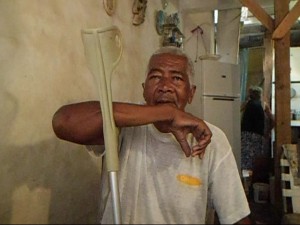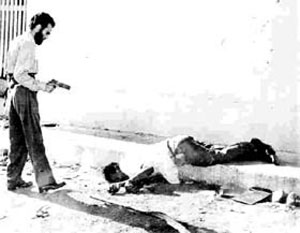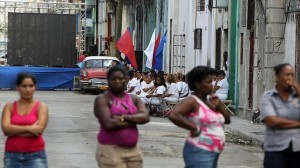 Havana, Cuba, November 2013, www.cubanet.org. — Juan Lazaro Avila Herrera, physically impaired (his right leg is lame) regrets having belonged in his youth to a firing squad at the La Cabaña Fort.
Havana, Cuba, November 2013, www.cubanet.org. — Juan Lazaro Avila Herrera, physically impaired (his right leg is lame) regrets having belonged in his youth to a firing squad at the La Cabaña Fort.
When he served in the Association of Rebel Youths, at only 18 years of age, he was attracted to belonging to the firing squads. He remembers that along with him, a group of 23 youths, aged between 16 and 20, were captivated.
According to him, sometimes the executioners seized rings and other items from the people shot.
Once he was accused of counterrevolution and taken to the Principe prison. He says that during the trial he was so scared that he defecated in his pants. He thought he would be shot, but he was absolved. In spite of that, after he left jail, for a week he had to go sign in every day at a police unit.
“I was infiltrated into a counterrevolutionary band and participated in several operations. In one of them I arrested a priest, from whom we confiscated in the basement of the church explosives and weapons plus a map where the places were marked that would be blown up,” he recounts.
 He says he is remorseful for having been at the point of killing a man named Jose Diaz when he arrested him in his home, where they took him with 14 AKs and several Makarov pistols. “I put the pistol to his forehead and squeezed the trigger. If I did not kill him it was because the weapon jammed,” he said.
He says he is remorseful for having been at the point of killing a man named Jose Diaz when he arrested him in his home, where they took him with 14 AKs and several Makarov pistols. “I put the pistol to his forehead and squeezed the trigger. If I did not kill him it was because the weapon jammed,” he said.
He served as investigator for the Ministry of the Interior (MININT) in the Guanabacoa police unit, dealing with cases of car theft and rape in the area of the beaches to the east of the capital. He remembers that one time, when he was investigating a case of the rape of a young girl of 12 years of age, he was outraged and beat the arrestee he was interrogating with the butt of his pistol.
Avila also belonged to the Merchant Marine. He says he has transported weapons and sugar to several countries, among them Angola, Nicaragua and Honduras. He says that in this latter country, 10 thousand tons of sugar were sent once, which were not for the Honduran people but were transported to a North American boat which was found lying alongside his boat.
“It was a mistake to have dedicated almost all my life to the Revolution. I ask myself all the time what did I fight for,” he told this reporter.
Avila Herrera retired with a pension of 279 Cuban pesos (slightly more than $10 US). He lives in a dwelling that is a hallway with kitchen and bath. He decided to tell his story to the independent press because he is very disappointed in the government he served and for which he was willing die and kill.
Michel Iroy Rodriguez, yeikosuri11@gmail.com
Cubanet, November 21, 2013
Translated by mlk


